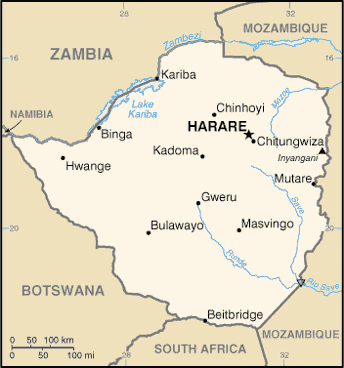Zimbabwe

The Republic of Zimbabwe has an estimated population of 12.6 million (UN, 2010). The capital is Harare. Zimbabwe has an area of 390,759 sq km (290,586 sq miles). The main languages are English (official), Shona, and Sindebele.
Since gaining independence in 1980 from Britain, Mugabe has been the only president of Zimbabwe. For years, it was considered as the breadbasket of Southern Africa. In 2000, Mugabe started his land redistribution campaign from white farmers to the black Zimbabweans, which led to sharp falls in production and resulted in food and fuel shortages. Many Zimbabweans have emigrated in search for better life.
Although Women represent 53 percent of the population in Zimbabwe, women are not represented in leadership or decision-making positions. They are, however, the first to bear the brunt of the economic crisis in Zimbabwe. Violence against women is widespread in the country. It has been reported that women who supported the opposition party Movement for Democratic Change (MDC) in the previous presidential election were targeted for assaults and even raped.
- Zimbabwe ratified the Protocol to the African Charter on Human and Peoples' Rights on the Rights of Women in Africa (The Maputo Protocol) on the 15th of April 2008.
- The Convention on the Elimination of All Forms of Discrimination against Women (CEDAW) was ratified by Zambia on the 13th of May 1991.
- Zimbabwe has not yet adopted a National Action Plan on United Nations Security Council Resolution 1325 (UNSCR 1325).
- There are no former or current UN peacekeeping mandates in Zimbabwe.
